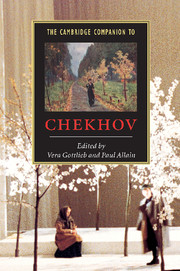Book contents
- Frontmatter
- Part 1 Chekhov in context
- Part 2 Chekhov in production
- Part 3 Chekhov the writer
- 16 Chekhov's stories and the plays
- 17 The stage representation of Chekhov's women
- 18 Chekhov's comedy
- Appendix 1 Chekhov's works: primary sources from the Russian - Variations of English titles from the Russian
- Appendix 2 Selected stage productions
- Appendix 3 Selected screen versions
- Appendix 4 Illustrations
- Selected bibliography
- Index of Works by Checkov
- General Index
18 - Chekhov's comedy
from Part 3 - Chekhov the writer
Published online by Cambridge University Press: 28 May 2006
- Frontmatter
- Part 1 Chekhov in context
- Part 2 Chekhov in production
- Part 3 Chekhov the writer
- 16 Chekhov's stories and the plays
- 17 The stage representation of Chekhov's women
- 18 Chekhov's comedy
- Appendix 1 Chekhov's works: primary sources from the Russian - Variations of English titles from the Russian
- Appendix 2 Selected stage productions
- Appendix 3 Selected screen versions
- Appendix 4 Illustrations
- Selected bibliography
- Index of Works by Checkov
- General Index
Summary
'First of all I'd get my patients in a laughing mood - and only then would I begin to treat them.'
Chekhov's words sum up the motivation for his comedy: laughter as medicine, and a vital prerequisite for any treatment of his fellow human beings. Implicit is the sense that laughter - and comedy - are restorative, and that the objectivity and detachment which laughter may produce could inoculate us against such human diseases as pomposity, hypocrisy, selfcentredness, laziness, or - the worst of all - wasting life.
It is Doctor Chekhov who wrote those words, and beneath them lies a serious but non-judgemental sense that laughter is curative and healthy. Chekhov's comedy is therefore not only a stylistic feature in his works, but is also a vital part of his philosophy. It is the point where content and form meet, the one usually inseparable from the other. And this, in turn, relates to the subject matter of his works - not the artificial and complex, though enjoyable, plot lines of farces by Labiche or Feydeau, or their third-rate imitators, but the daily lives of ordinary people.
- Type
- Chapter
- Information
- The Cambridge Companion to Chekhov , pp. 228 - 238Publisher: Cambridge University PressPrint publication year: 2000
- 2
- Cited by

